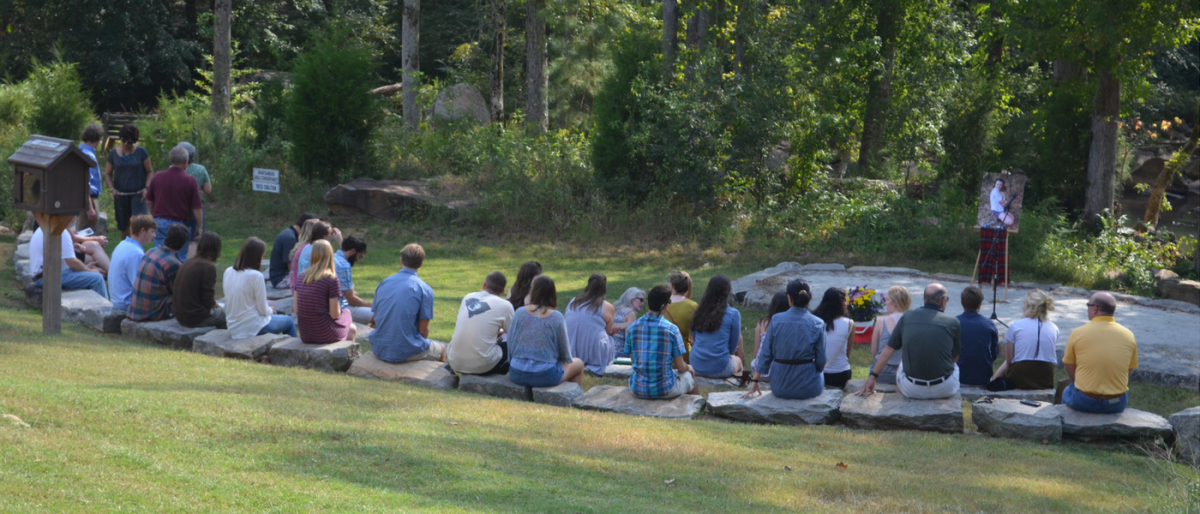By: Sarah Madden, Senior Writer
Wofford has lost two students to suicide in the past year, and this fall students and faculty have responded by memorializing and mourning both lives. For MacGregor Ruffin ’17, who passed away this summer, a service was held at the Goodall Environmental Studies Center in Glendale.
About 90 people attended the service, including Ruffin’s family. Several students and faculty spoke, and everyone was invited to stand up and share stories.
Following the speakers and music, the company processed from the outdoor amphitheater down the trail to a tree planted by the environmental studies department. Attendees each carried a flower to leave at the foot of the tree, and bagpipes played by Gary Hipp led the procession.
Senior environmental studies major Andrew Fowler announced that the senior class of environmental studies majors will dedicate Fowler’s capstone project, a rain garden, to the memory of Ruffin:
“We’re a tight-knit group—there’s only about a dozen of us—and now one of us is missing. We decided to dedicate a project to MacGregor. It will be a rain garden, where water runoff from rain events will gather. This takes away pollution, takes stress off the rivers and prevents flooding. But this will be a piece of earth where we can work and get our hands dirty, just like MacGregor loved to be surrounded by nature.”
After the dedication announcement, attendees were invited to the veranda for light refreshments and a chance to write notes to the family. The notes were compiled in a notebook for the family. Despite the deep sorrow of the event, there were laughs and funny stories shared as well.
Reverend Ron Robinson, Perkins-Prothro Chaplain and Professor of Religion, says that it is important for the community to come together in meaningful and creative ways to acknowledge loss, to care for each other and to find strength for the future. Robinson collaborated with Wofford students to plan Ruffin’s memorial and facilitated the event.
“The death of a young person is always a tragedy,” he says. “People are shocked, disoriented, sad and even angry. In the case of suicide, we may even wonder why our relationship with our friend wasn’t enough to keep them from taking their life. A gathering is a way to name and acknowledge these feelings, to remember positively the student who has died and to offer support to each other.”
Ruffin, who was also a studio art minor, will be honored with an exhibit in the spring.
West Summers IV ’16, who passed away in November 2015, is being memorialized on campus through his photography. Photography professor Bryan Hiott says that his digital photography classes were drawn to Summer’s nature images and decided that displaying them on campus would be an appropriate way to celebrate him.
“Dr. Youmi Efurd and I discussed the exhibition idea last spring, and she reserved the Sandor Tesler Library Gallery for West’s images to be shown during August through September this year,” says Hiott. “I selected 18 photographs West made in the fall of 2015 during a class trip to Glendale Shoals and the Goodall Environmental Studies Center.”
Hiott also worked with Summer’s parents in order to preserve his photographs, especially those that he had posted to his WordPress Blog along with comments about them. “Last week, [his mother] called me to say that she had been on campus to see the exhibition and was so pleased with the way it looks. She and her husband were both deeply moved by the college’s gesture.”
Hiott believes that although the exhibit does not explicitly address mental health, its presence is important to the Wofford community: “I think how the exhibition came about speaks to the importance of community and caring here at Wofford. Each person matters, and any loss is a loss for all of us. It is the strength of our community that can sustain us in difficult times, allow us to reach out to those in need and to be there for one another. “
Like the rain garden is meant to reflect Ruffin’s spirit in the future as it grows over time, Hiott believes that this exhibit for Summers connects him to the Wofford community still. “As we look at West’s images and reflect on his friendship and kindness, he is speaking to us still, in the quiet beauty of a fall day at the river.”
Robinson also agrees that these kinds of memorials are more about the future than the past.
“Someone suggested to me that these events bring closure. I’m not fond of that term,” he says. “While meeting with the students planning the memorial for MacGregor, I briefly mentioned the suicide of a close friend when I was 21. My voice broke a bit as I told this to the students. Closure doesn’t happen. But life continues to happen, and we can embrace it. My friend David is still part of my own story. MacGregor and West will be part of their friend’s stories, too. It is important that we don’t romanticize suicide and it is also imperative that we don’t ignore it. Events like the ones we are hosting on campus let us know that grief is real and that we are not alone as we deal with it.”
























